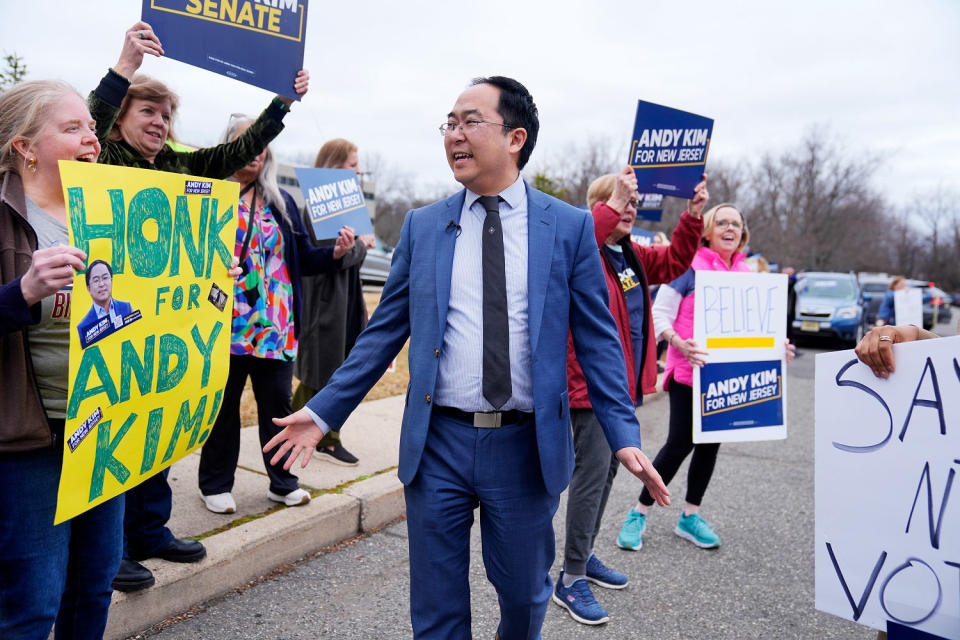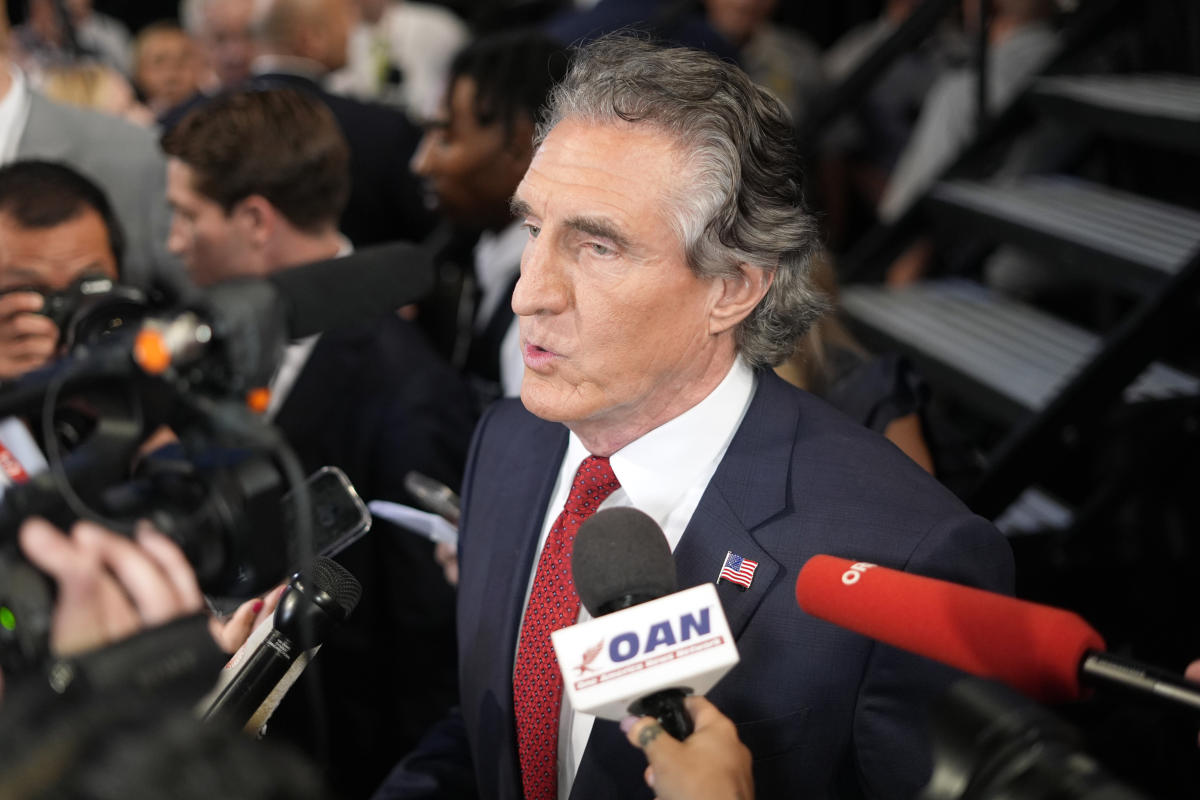Gouri Sadhwani, a longtime New Jersey resident and Democrat, is less than enthusiastic about this year’s presidential race and says she plans to vote for President Joe Biden as a “defensive” measure against Donald Trump. But she gets excited when discussing the Senate race, especially the Democratic candidate, Rep. Andy Kim.
“Andy Kim is very different,” says Sadhwani, 52, who moved to New Jersey from India as a child. “He just happens to be in the right place at the right time and with the right amount of courage.”
Sadhwani is among the fast-growing group of Asian Americans in New Jersey, which grew by 99% between 2000 and 2022. They constitute 11% of the state’s population. They are also incredibly diverse. While Indian Americans make up more than 40% of all Asian Americans in the state, there are also significant numbers of Chinese, Filipino and Korean Americans. And it is amid these changing demographics that Kim is running for a seat in the Senate.
Voters and experts say New Jersey candidates and parties have not historically been particularly effective at engaging Asian Americans. With Kim leading the Democratic primary next Tuesday, many say his campaign could help usher in a new era of motivated voters. For Kim, who would be the first Korean-American U.S. senator if elected, this is a chance to listen to a voting bloc that has felt excluded from American politics.
“We don’t just want to be called out by political figures when there’s a spike in xenophobia,” Kim said in an interview, speaking as a member of the Asian American community. “Don’t treat us like a special interest group. Treat the community as a complete, dynamic, complex and complicated community that you must listen to.”

For years, Asian Americans in New Jersey felt like the political system was not “for them.”
Asian Americans now make up more than 9% of eligible voters in New Jersey, and this number is growing rapidly. From 2010 to 2020, the number of eligible Asian American and Pacific Islander voters in the state grew by 42%, while the overall statewide voting population grew by 5%. And in many areas the electorate has proven to be an unquestionably critical voting bloc. For example, in Middlesex County, the state’s second most populous county, Asian American eligible voters make up nearly 38% of the electorate. In Bergen County, the most populous county, Asian American voters hold nearly a quarter of the vote.
But traditionally, Asian American voter reach in the state has been sparse. Nationally, 56% of Asian Americans were disconnected from the Democratic Party, according to a 2022 survey. And about two-thirds reported the same of Republicans.
Democratic strategist Trip Yang said New Jersey candidates have historically excluded the Asian American electorate because they “don’t take the time necessary to understand it.” It is also believed that reaching such a diverse electorate is too complicated and expensive. But given the rapidly rising population, that is “a big mistake,” Yang said.
“Phil Murphy of the Democrats, who ran for re-election as governor, defeated his Republican opponent by just 3 points,” Yang said of Murphy’s 2021 race against Jack Ciatarelli. “There was a huge missed opportunity for any campaign not to go after Asian Americans.”
With more than 68% of Asian American adults in New Jersey speaking languages other than English at home, better-resourced campaigns can make their reach even more effective by translating materials into Asian languages, including Hindi, Chinese and Korean.
Regardless of funding, when it comes to pursuing the Asian American vote, “just do it,” Yang said.
Asian American New Jersey voters who spoke to NBC News said they themselves did not grow up in households that were particularly active in politics. Their immigrant families, they said, never felt like the political system was “for them.” Others said their families often avoided any political discussion that was seen as controversial or uncomfortable.
Hyun-Ju Kwak, a member of the nonprofit Action Together New Jersey, said politics in the state can be extremely difficult to access outside the “corridors of power and influence,” calling it an “old boys network.” For Asian Americans, many of whom are immigrants, politics can take a back seat when creating financial security and a foothold in a new country are the priorities.
“The immigrant story is not about coming to a new country and being politically engaged,” Kwak said. “It’s really about survival and social mobility and freedom. So then it’s up to the second generation, or ‘one-point-fivers’, like Andy, who can now say: ‘I want to give something back.’
Behind the new era for Asian American voters
Kim announced in September that he was challenging longtime Democratic incumbent President Bob Menendez after Menendez was indicted on charges of taking bribes in exchange for official government actions. In the scant recent polls, Kim was ahead of the two leading Republican candidates for next week’s primary, businessman Curtis Bashaw and Mendham Mayor Christine Serrano Glassner. Kim, 41, the son of Korean immigrants, said his own experience growing up in South Jersey was largely similar to that of other Asian Americans whose families stayed away from politics.
Given the rarity of Asian Americans in federal office, Kim’s attempt to run in 2018 to represent New Jersey’s Third Congressional District came with some uncertainty about how to handle his identity. And his victory surprised some, especially since there were no Korean Americans in Congress at the time.
“I have had people in politics who really advised me not to talk about my family story in a recognizable way as Asian. And I thought, ‘I’m pretty sure people are going to figure this out,'” Kim recalled with a laugh. “It’s a district that voted for Trump twice. … A lot of people, including political pundits, didn’t really think I could win.”
But a collision of factors in recent years has culminated in what he calls “the most engaged moment” for Asian Americans today. For starters, Asian American communities across the country have matured, he said, and now more young people are seeing themselves running for office. Kim added that the rise of anti-Asian hate during the height of the Covid pandemic also caused previously apolitical people to see the need for involvement.
“That has led to a level of advocacy and activism, as well as monetary investment in various groups, organizations and communities across the country that I have not seen before,” he said.
Tapping into a diverse, ‘unheard’ electorate Of course, simply being Asian-American doesn’t guarantee you’ll get Asian-American votes. Sadhwani said the community expects more than just “people who look like them.” It was Kim’s ‘humanity’ that spoke to her. She said she first heard of Kim after seeing a viral photo of him on his knees on the floor of the Capitol, cleaning up after the Jan. 6, 2021, riot.
“There was something so beautifully simple and decent about that act, which was… ‘Instead of standing on a stage and shouting about it, I’m actually going back to work,’” Sadhwani said. “It also symbolizes someone who wasn’t above picking up trash, and … I don’t think most politicians would do that.”


Engaging Asian American voters means getting to know them, rather than stereotyping their concerns, Kim said. And so far he has found that they are not that different from other voters.
“Many of the AAPI families I’ve talked to in New Jersey, their top issues are the issues that others are concerned about: health care, education,” Kim said. “I caution people in politics to just assume that if they have to do a digital ad for AAPI communities, you have to make it about AAPI hate and things like that.”
He said he hopes Asian Americans can have a voice on all issues and that they don’t just exist “on the fringes of Lunar New Year” for politicians.
Although New Jersey’s Asian American community is diverse, with a range of cultures to reach, Kim said the experience of being an immigrant is the most unifying experience.
“It’s this shared experience of the nervousness of immigrating to America, the courage it took to be able to support and raise your children in this way and invest in their education that gives them these opportunities,” Kim says. said. “That’s a really powerful thing for a lot of AAPI communities.”
Ultimately, Kim’s campaign will benefit from what many see as his authenticity, Yang said.
“He came across as quite authentic because he didn’t wait for a poll or focus test to put himself in the race,” Yang said, adding that Kim came in after Menendez was indicted and said he had no intention of resigning. “He didn’t do the song and dance that other political figures might have, and he just said, ‘I’m going to run.’”
Sadhwani, who sees immigration and the economy as among the most important issues for her in this election, said Kim’s openness appears to have had a real impact on Asian Americans and others in her community. She said she feels Kim stands in contrast to Menendez, whose 17-year tenure she said was driven by insider politics and an insensitivity to change.
“In our North Jersey area, a lot of people are having fundraisers for him, and he shows up at all of them,” Sadhwani said of Kim. “We have friends who have never really been politically active, who organize things for him. And I think it comes from this opportunity to actually have a voice that represents us.”
She added that for her, Kim “represents an America that looks different than it did 100 years ago.”
This article was originally published on NBCNews.com







